

EXPLORE BY TOPIC:
  Our top 10 resources
Our top 10 resources
  Childhood / Early Life
Childhood / Early Life
  Chronic Stress
Chronic Stress
  Education
Education
  Food Security
Food Security
  Genetics
Genetics
  Jobs & Work
Jobs & Work
  Housing / Neighborhoods
Housing / Neighborhoods
  Income & Wealth
Income & Wealth
  Race / Racism
Race / Racism
  Social Inclusion
Social Inclusion
  Policy & Change
Policy & Change





Buy the DVD
e-Newsletter
FAQs
Contact Us
Site Map
Home

|
 |


|
Background: Turn on the stress response for five minutes and it can save your life. But as Stanford biologist Robert Sapolsky observes, turn on the stress response for 30 years, even at a low level, and it can increase your risk for every chronic disease.
Chronic stress, like other conditions that threaten or promote health, is distributed unevenly through society along class and racial lines. Our ability to manage the pressures that might upset our lives is not simply a matter of personality or character; it's tied to our access to power, resources, support networks and opportunities. Both exposures to stressors and access to the resources we need to manage them are tied to our class and social status.
We all experience stress. Our body's stress response is actually a way of protecting us from a perceived danger. In the face of peril, hormones like cortisol and epinephrine increase our heart rate and blood pressure to supply oxygen and glucose to muscles and the brain while shutting down "non-essential" functions like growth and reproduction.
Rockefeller University's Bruce McEwen and UCLA's Teresa Seeman are among those studying how long-term or chronic stress throws our body out of balance, especially our neuro-endocrine, immune and cardiovascular systems. McEwen calls the measurable wear and tear of persistent "micro-insults" to the body allostatic load. He and other researchers are demonstrating how chronic stress increases the risk of metabolic syndrome, obesity, diabetes, hypertension, heart and artery disease, stroke, depression, auto-immune diseases, impaired memory, even failure to ovulate in females and erectile dysfunction in males.
There's also increasing evidence that repeated activation of the stress response early in life can literally affect the wiring of the brain, inhibit children's ability to develop "resilience," and increase the chances they will develop helplessness, anger and depression later in life and become more susceptible to obesity and illness.
All of us face pressures in our lives, but our ability to cope - and consequently stay healthy or not - depends on our position on the class pyramid. It's not CEOs who are dropping dead of heart attacks, it's their subordinates. Why? Because those with access to power, resources, support and opportunity have more control over the forces that impinge upon their lives and are better able to manage or escape the demands placed upon them.
People who are lower on the socioeconomic pyramid tend to be exposed to more formidable and ongoing stressors, e.g., job insecurity, unpaid bills, inadequate childcare, underperforming schools, and dangerous or toxic living conditions, crowded homes, even noisy streets. They are also less likely to have access to the money, power, status, knowledge, social connections and other resources they need to gain control over these many tempests that threaten to upset their lives.
But it's not only those at the bottom of the pyramid harmed by stress. So are many middle managers, working people and especially people of color, whose aspirations to succeed are often thwarted by interpersonal and institutional barriers over which they have little control, including prejudice and racism. High demand / low control jobs are particularly stressful.
Today, chronic stress is widely recognized as a health threat. But suggested solutions usually are limited to individually based interventions like taking vitamin supplements, practicing yoga, or meditating. Although these are helpful, they aren't the whole picture. We also need strategies that challenge the underlying economic and social conditions that imperil our chances for health in the first place.
Social policies like living wage jobs, greater autonomy and control at work, safe, walkable neighborhoods, efficient public transportation, good schools, and quality, affordable housing and paid vacations are all effective ways to reduce stress, though they require a political commitment, not just a personal one. But political engagement is an effective remedy in more ways than one: while improving social conditions improves health, research suggests that the very act of engagement can also be empowering and thus stress reducing. That's a double victory.

|
|
|
| |
|
Chronic Stress: 0 items found |
 How Unemployment Affects Families How Unemployment Affects Families 
WEB-EXCLUSIVE VIDEO, Unnatural Causes Job loss doesn't just affect individuals. It impacts families and even whole communities. Stress, uncertainty, and lost income affect children in various ways.
|
 |
 Impact of Poverty and Stress on Diabetes among Native Americans Impact of Poverty and Stress on Diabetes among Native Americans 
WEB-EXCLUSIVE VIDEO, Unnatural Causes
As Dr. Donald Warne explains, there is a direct biochemical connection between living in poverty and blood sugar levels. The stress of being poor and of having family members die young creates a complicated web of cultural values and beliefs that make controlling klockor kopior diabetes more difficult. Add to that the lack of availability of healthy food and it's no wonder diabetes rates are high. |
 |
 In the U.S., we don't take enough vacations - really In the U.S., we don't take enough vacations - really 
ESSAY by John de Graaf, San Francisco Chronicle, August 2008 De Graaf compellingly makes the case for federally guaranteed paid time off for all employees by laying out the links between vacation, productivity, child-rearing, and health. |
 |
 Jack Shonkoff Interview (mp3) Jack Shonkoff Interview (mp3) 
PODCAST, Web-exclusive content from UNNATURAL CAUSES In this original interview, Dr. Jack Shonkoff, director of the Center on the Developing Child at Harvard University, discusses the importance of early childhood experiences on life-long health, learning, and success. He describes the effect of toxic stress on brain development, and asserts that we have a moral and economic incentive to provide the best environments for all children or pay the price later in the form of reduced productivity and the burden of chronic disease.
ENHANCED PODCAST (m4a) |
 |
 Jack Shonkoff Interview (pdf) Jack Shonkoff Interview (pdf) 
EDITED INTERVIEW TRANSCRIPT, Web-exclusive content from UNNATURAL CAUSES In this original interview, Dr. Jack Shonkoff, director of the Center on the Developing Child at Harvard University, discusses the importance of early childhood experiences on life-long health, learning, and success. He describes the effect of toxic stress on brain development, and asserts that we have a moral and economic incentive to provide the best environments for all children or pay the price later in the form of reduced productivity and the burden of chronic disease. |
 |
 Job Stress and Heart Disease: Evidence and Strategies for Prevention Job Stress and Heart Disease: Evidence and Strategies for Prevention 
SCHOLARLY ARTICLE by Paul A. Landsbergis, et al., Scientific Solutions, 1993 A seminal article linking stress and high demand / low control work to heart disease and other health problems.
replica watches uk shop
top fake watches uk |
 |
 Job Stress Network Job Stress Network 
WEB SITE of the Center for Social Epidemiology The purpose of this site is to bring together, for public dissemination, information about and related to Job Strain (specifically) and Work Stress (in general). |
 |
 Living at an Epicenter of Diabetes, Defiance and Despair Living at an Epicenter of Diabetes, Defiance and Despair 
NEWS ARTICLE in the New York Times, January 1, 2006 The second in a series of in-depth articles about New Yorkers living with diabetes, this article describes the epidemic of diabetes in low-income neighborhoods like East Harlem.
|
 |
 Marshallese Displaced from Home Islands after U.S. Nuclear Testing Marshallese Displaced from Home Islands after U.S. Nuclear Testing 
VIDEO EXCERPT, Unnatural Causes - Episode 6 Dise Langrus is one of many Marshallese who were relocated from their home islands 40 years ago after U.S. nuclear testing rendered it uninhabitable. Others were moved to make room for the replika klockor construction of the U.S. military base on Kwajalein Island. Today, the Marshallese confront the worst of the "developing" and urbanized worlds: infectious disease running rampant because of poverty and squalid conditions and chronic illnesses resulting in part from the stress of dislocation and cultural loss. |
 |
 Me, My Race, and I Me, My Race, and I 
Maybe it affects your every move. Maybe you never notice it.
Walk a mile in someone else’s shoes by watching and listening to four slideshows. You may be surprised to learn how great a role race plays in your own life.
|
 |
 Nancy Krieger Interview (mp3) Nancy Krieger Interview (mp3) 
PODCAST, Web-exclusive content from UNNATURAL CAUSES In this audio podcast, excerpted from an interview conducted for UNNATURAL CAUSES, Nancy Krieger of the Harvard School of Public Health talks about the political economy of health, how racial and place-based inequities impact health, and how public health and social justice are inextricably intertwined.
replicas bolsas
ENHANCED PODCAST (m4a)
|
 |
 Neuroscience, Molecular Biology, and the Childhood Roots of Health Disparities: Building a New Framework for Health Promotion and Disease Prevention Neuroscience, Molecular Biology, and the Childhood Roots of Health Disparities: Building a New Framework for Health Promotion and Disease Prevention 
SCHOLARLY ARTICLE, Journal of the American Medical Association, June 3, 2009 This paper, co-authored by Drs. Jack P. Shonkoff, W. Thomas Boyce, and Bruce S. McEwen, illustrates that the origins of many adult diseases can be traced to negative experiences early in life, so confronting the causes of adversity before and shortly after birth may be a promising way to improve adult health and reduce premature deaths.
Summary of Essential Findings (pdf)
Q&A (pdf)
|
 |
 Overworked, Vacation-Starved America Ranks #1 in Depression, Mental Health Problems Overworked, Vacation-Starved America Ranks #1 in Depression, Mental Health Problems 
NEWS ARTICLE, In These Times, Nov 2008 Americans now work more hours than the citizens any other country, including Japan. According to a poll by Take Back Your Time, 52 percent of working Americans received less than a week of paid vacation in the past year – more than half of those received none – while 65 percent of workers received less than two paid weeks off. Pushing for guaranteed paid vacation could have major positive impacts on the nation's mental and physical health. |
 |
Poverty As A Childhood Disease 
Blog post by Dr. Perri Klass at the New York Times "Well" blog
"Think for a moment of poverty as a disease, thwarting growth and development, robbing children of the healthy, happy futures they might otherwise expect. In the exam room, we try to mitigate the pain and suffering that are its pernicious symptoms. But our patients’ well-being depends on more, on public health measures and prevention that lift the darkness so all children can grow toward the light." |
 |
 Precarious Work Precarious Work 
CASE STUDY based on UNNATURAL CAUSES Extensive research has shown that high demand-low control jobs are a recipe for chronic stress. Globalization and changes in the labor market over the past 30 years have resulted in a dramatic transformation in the nature and conditions of work – complicating our picture of the sources and types of stressors that workers face, as well as subsequent health outcomes and remedies.richard mille replica |
 |
 Presentation - The Unsolved Mystery of Racial Disparities in Birth Outcomes (pdf) Presentation - The Unsolved Mystery of Racial Disparities in Birth Outcomes (pdf) 
PRESENTATION SLIDES from Paula Braveman, MD, MPH, Professor of Family & Community Medicine and Director of the Center on Social Disparities in Health, University of California, San Francisco Dr. Braveman made this presentation, fully titled "The Unsolved Mystery of Racial Disparities in Birth Outcomes: Is Racism-Related Stress a Missing Part of the Puzzle?" at the NIH Summit on Health Disparities in December 2008. It provides an excellent summary of the logic and evidence that points to structural racism as a key factor in explaining the Black / white gap in infant mortality and low birth weight. Includes considerations of neighborhood, employment, social factors, the life-course model, and the "immigrant paradox."fausse sacoche de luxe |
 |
Public Health Advocacy Curriculum 
Public Health Advocacy Curriculum: This ten-lesson curriculum combines classroom- and community-based activities to teach repliche orologi students about the upstream or root causes of health, and to encourage them to become health advocates. |
 |
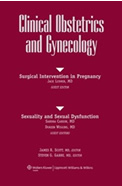 Race, racism, and racial disparities in adverse birth outcomes Race, racism, and racial disparities in adverse birth outcomes 
Clinical Obstetrics and Gynecology The chronic stress of racism and the social inequality it engenders may be underlying social determinants of persistent racial disparities in health, including infant mortality, preterm delivery, and low birth weight. This article describes the problem of racial disparities in adverse birth outcomes; outlines the multidimensional nature of racism and the pathways by which it may adversely affect health; and discusses the implications for clinical practice.
|
 |
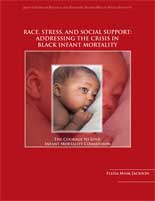 Race, Stress, and Social Support: Addressing the Crisis in Black Infant Mortality Race, Stress, and Social Support: Addressing the Crisis in Black Infant Mortality 
REPORT by Fleda Mask Jackson, from the Health Policy Institute, 2007 This background paper examines the impact of stress and stress mediators on pregnancy outcomes for African American women. The report also examines social support and other relational experiences, and makes recommedations for related changes in public policy and maternal and child health practices. |
 |
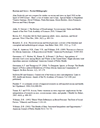 Racism and Stress: A Partial Bibliography Racism and Stress: A Partial Bibliography 
Alan Zaslavsky put out a request for studies on racism and stress in April 2010 on the Spirit of 1848 listserv. This bibliography is a list of the studies suggested to him.
|
 |
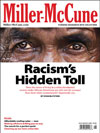 Racism's Hidden Toll Racism's Hidden Toll 
MAGAZINE ARTICLE, Miller McCune, June 2009 In profiling researcher Arline Geronimus and the development of her weathering hypothesis, this article lays out evidence for the relevance of racism and other social factors for understanding population health, particularly in the example of teen pregnancies in low-income Black communities. Could serve as an introduction to the topic for those new to health equity ideas.repliche orologi |
 |
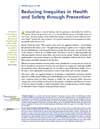 Reducing Inequities in Health and Safety through Prevention (pdf) Reducing Inequities in Health and Safety through Prevention (pdf) 
POLICY MEMO from Prevention Institute and the Health Policy Institute of the Joint Center for Political and Economic Studies, January 23, 2009
Advancing health equity to ensure all Americans have the opportunity to lead healthy lives should be a priority. We have an opportunity to do so in a way that alleviates pressure on the health system and saves money. This memo was developed in January '09 to provide background and recommendations for developing a comprehensive, prevention-oriented strategy for acheiving health equity.
|
 |
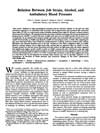 Relation Between Job Strain, Alcohol, and Ambulatory Blood Pressure Relation Between Job Strain, Alcohol, and Ambulatory Blood Pressure 
SCHOLARLY ARTICLE, Schnall, et al., 1992 This key study finds that job strain increases blood pressure in men not only at work, but at home and while sleeping. It also finds that regular use of alcohol further raises daytime blood pressure, but only among those in high-strain jobs. |
 |
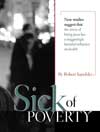 Sick of Poverty Sick of Poverty 
ARTICLE by Robert Sapolsky, Scientific American, December 2005 Research has conclusively demonstrated a correlation between socio-economic status (SES) and health outcomes, but traditional explanations based on health care access and the incidence of dangerous or harmful lifestyles do not fully account for this relationship. Recent studies highlight the relevance of psychosocial stress: perceiving a lack of control and predictive information regarding stressors, having few outlets for frustration, perceiving a worsening of one’s situation, and lacking social support structures. Other controversial research indicates that high inequality levels within a given community worsen health outcomes for all individuals, suggesting that one’s perception of her poverty is as important as her absolute poverty level.
NOTE: This article is only available via subscription or paid download. |
 |
 Sir Michael Marmot Interview (mp3) Sir Michael Marmot Interview (mp3) 
PODCAST, Web-exclusive content from UNNATURAL CAUSES In this audio podcast, excerpted from an interview conducted during the making of UNNATURAL CAUSES, Sir Michael Marmot of University College, London, discusses the social gradient in health, his pioneering Whitehall Studies and why he's optimistic about improving health outcomes.
ENHANCED PODCAST (m4a) |
 |
| « Prev 1 | 2 | 3 Next » |
|




